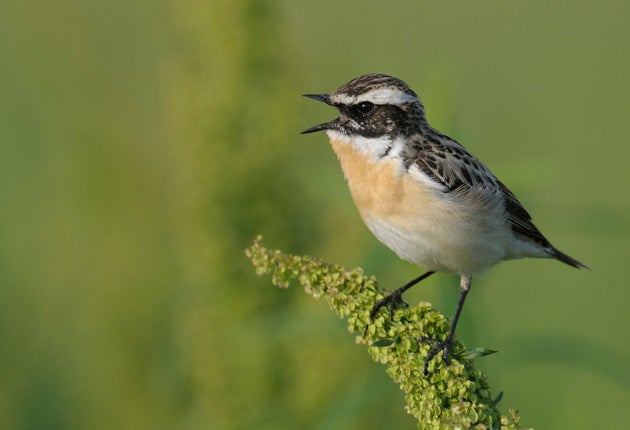Going for a song: a mysterious vanishing act
A much-loved summer visitor is fast disappearing, and no one knows why

Your support helps us to tell the story
From reproductive rights to climate change to Big Tech, The Independent is on the ground when the story is developing. Whether it's investigating the financials of Elon Musk's pro-Trump PAC or producing our latest documentary, 'The A Word', which shines a light on the American women fighting for reproductive rights, we know how important it is to parse out the facts from the messaging.
At such a critical moment in US history, we need reporters on the ground. Your donation allows us to keep sending journalists to speak to both sides of the story.
The Independent is trusted by Americans across the entire political spectrum. And unlike many other quality news outlets, we choose not to lock Americans out of our reporting and analysis with paywalls. We believe quality journalism should be available to everyone, paid for by those who can afford it.
Your support makes all the difference.One of Britain's most attractive songbirds has vanished from most of southern England in a dramatic population decline, new research shows.
The whinchat is a summer visitor from Africa with an orange breast and a prominent white eyestripe. It was widely scattered across the country 20 years ago, but is now virtually extinct south of the Pennines, apart from colonies on Salisbury Plain, Exmoor and Dartmoor.
The astonishing extent of its disappearance has been revealed by fieldwork for the new atlas of the breeding birds of Britain and Ireland, which will be published in 2012. This shows a conspicuous thinning-out of whinchat records across the British Isles, compared with those in the last atlas, which covered the period 1988 to 1991.
But the most remarkable aspect of the new research is the wholesale vanishing of Saxicola rubetra from huge swathes of southern England, including areas which were once considered whinchat strongholds, such as the Brecklands of Norfolk, and the New Forest in Hampshire.
"It's a pretty alarming decline," said Dawn Balmer of the British Trust for Ornithology (BTO), who is co-ordinating the Bird Atlas 2007-11 project. Ms Balmer stressed that the results were provisional, and more records might come in for Scotland and Ireland. But southern England, she said, had by now been comprehensively covered and the current map was likely to show the true picture.
"We don't really know why it's gone, because in many of its former breeding areas, such as Shropshire, nothing has really changed. Something could be affecting the species on migration," she said.
Several factors support the theory that the whinchat population may be declining because of problems the birds face on their annual odysseys to and from Africa south of the Sahara.
One is that the whinchat's nearest relative, the stonechat, has more than trebled its numbers since 1995, while the migratory whinchat has decreased by 43 per cent over the same period. The stonechat occupies similar habitats of heathland, gorse and bracken-covered hillsides, but stays in Britain all year.
A second factor is that several other sub-Saharan migrant species are showing similar substantial declines. These species range from the turtle dove (66 per cent decline since 1995) and the wood warbler (60 per cent), to the pied flycatcher (51 per cent), the nightingale (41 per cent) and the cuckoo (37 per cent).
The migrant declines have prompted the BTO to begin research on these species' wintering habitats to see if they are running into trouble during the times they spend in Africa.
The whinchat is much appreciated by birdwatchers. "It's a lovely species, and its song is part of the filigree background sound of spring," said Mark Cocker, author of Birds Britannica.
"Its disappearance is deeply saddening, and further evidence that something truly disturbing is happening to our summer migrants," said Graham Madge, conservation spokesman of the Royal Society for the Protection of Birds.
Join our commenting forum
Join thought-provoking conversations, follow other Independent readers and see their replies
Comments